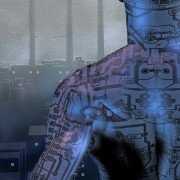What We’re Reading: Children of Time
TDW: Children of Time by Adrian Tchaikovsky is one of those books I saw on Amazon popping up, but I never saw any coverage on social media or other outlets. Instead I read a single review on Goodreads by someone I followed that sold me immediately. It’s really quite crazy how much more important word of mouth is than any other marketing avenue. It also helps if the book you publish is truly excellent.
Which brings us to Children of Time. It has everything you could want.
Do you LOVE careful considerations of gender? Check.
Do you appreciate a wealth of characters who defy stereotypes? Check.
Do you desire generation ship novels where humanity is struggling to meet their destination? Check.
Do you want for books written by trained scientists? Check.
Do you enjoy sweeping sci fi epics that really push the boundaries? Check.
Do you HATE spiders? Ah, well, err… maybe skip this book.
This is a book on a grand scale. Humanity has killed itself and its last survivors set out on cobbled together generation ships to hunt for liveable planets. Thankfully, humanity had spread far and wide on terraforming missions before the calamity, and so these are the destinations the gen ships head to. The Gilgamesh is one such ship, and it is headed for Kern’s World. However, the terraforming experiment on that world has gone slightly awry – not quite to plan – and so the remnants of humanity must deal with problems they could never have ever conceived.
What I found particularly brilliant is the meshing of the author’s knowledge of both psychology and zoology in the perfect mix. It allows for a deep exploration of human nature, and also a very clever take on gender roles. How can we change what we evolved from? This book asks the big questions, and the resolution really left me stunned, in a good way. It’s a great example of plotting as everything builds to a climax, the author keeping his cards very close to own chest until just the right moment.
I really can’t give away too much, but the main thing to know is that this book contains SPIDERS. Spacefaring spiders. What more do you need to know at this stage? Perhaps how the book explores the growth of a civilisation that originally began life as minuscule jumping spiders. In fact, there is an element of Echopraxia by Peter Watts, using the Portia genus of spider as inspiration for the story. The juxtaposition of humanity to the spiders is masterful and even beautiful, their lives touching on each other until confrontation just can’t be avoided. The title, Children of Time, sums it up.
Aside from that I can’t say anything but to urge you to read it now. Time is of the essence!









